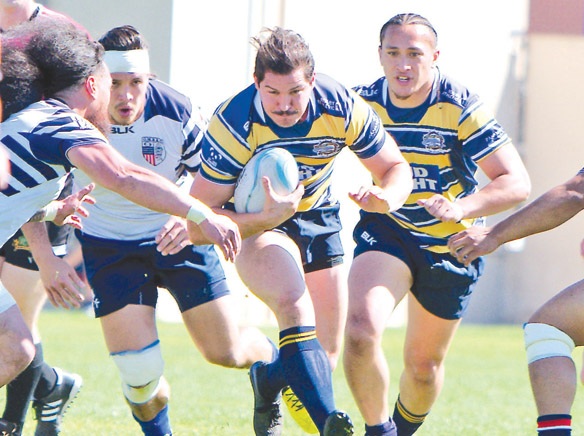The game of rugby originated almost 200 years ago in the English town of Rugby in Warwickshire. It was brought to America 50 years later and was eventually modified to establish our grid iron football. People often ask about the similarities and differences between these two popular sports. We often hear observations that, as rugby is “football without pads” it must be more dangerous and brutal. Bumper stickers such as “give blood, play rugby” help to reinforce that viewpoint. In fact, however, the opposite is probably true because in rugby, yardage gains are much less important and the lack of football’s “body armor” requires safer (head to the side) tackles which do not result in the violent head-to-head clashes that can lead to chronic traumatic encephalopathy (CTE). Certainly, rugby is a very physical, robust game but many years of tradition dictates that any aggressive behavior must be within the rules and ALWAYS left on the field of play. Throughout the many years that I played and coached rugby all over the world, I have never witnessed any ill feeling nor aggressive, anti-social behavior after the game has ended.
Both games similarly involve passing, tackling and converting end-zone touchdowns but, perhaps, the most noticeable differences are that rugby squads usually comprise only 15 players plus five substitutes and all players function in attack and defense, whereas football has more specialized positions and can have up to 90 players in a squad, some of which never even get to play in a game. Additionally, most football players don’t make it to the professional ranks and their football career is over after college or even high school as there are negligible opportunities to continue playing. Conversely, most rugby clubs have several teams and players can literally participate up to 80 years of age. “Golden Oldies Rugby” is a worldwide organization established 20 years ago for players over 35 years of age. All over the world there are thousands of participants with several different playing levels. The older players wear different colored distinguishing shorts or vests. As an example of this: 60 to 65 year-olds wear red, 65 to 69 year-olds wear gold and players 70 plus years old wear purple. Associated rules regarding tackling limitations are aimed at ensuring safety. More information is available on Golden Oldies Rugby.com, which also includes information on the 2020 Golden Oldies World Rugby Championship in Denver, Colorado.
Sportsmanship and civility are consistently emphasized as soon as children are introduced to the game of rugby and this is very evident around our Seal Beach/Long Beach local parks and school fields where around 500 participants (boys and girls) 5-18yrs are playing. Many parents are also involved and the increasing success can be noted at High Schools like Los Alamitos, Wilson, Millikan, Lakewood and St. Anthony’s where rugby standards are increasingly high. Long Beach State has a long-established tradition of excellence and, of course, our local Belmont Shore Rugby Club is consistently one of the best teams in the country.
A shining star in the Belmont squad is Adrian Ojeda who combines outstanding athleticism with terrific personal values.
Adrian was recently chosen as USA Rugby’s MVP and his dynamic play is eagerly anticipated when Belmont Shore takes the field. He is also greatly respected and admired by colleagues where he works with special needs children.
A “gentle giant,” Adrian combines physical prowess with human kindness to those in need. Adrian’s father, Ernie, also played for Belmont Shore and is internationally recognized for his expertise in Federal Emergency Management Relief services and counsel. He credits his son’s determination, fortitude and citizenship to his ancestral background with the Yaqui Tribe in Mexico.
Several other Belmont players have similar background and welcome interested supporters to their games at Long Beach University. Information is available on www Belmontshore rugby.com.
Former England international rugby player and coach, Ed Robinson, who was also a professor at CSU Long Beach updates Sun Region readers regularly on the unprecedented explosion of rugby here in the Long Beach/Seal Beach area.












